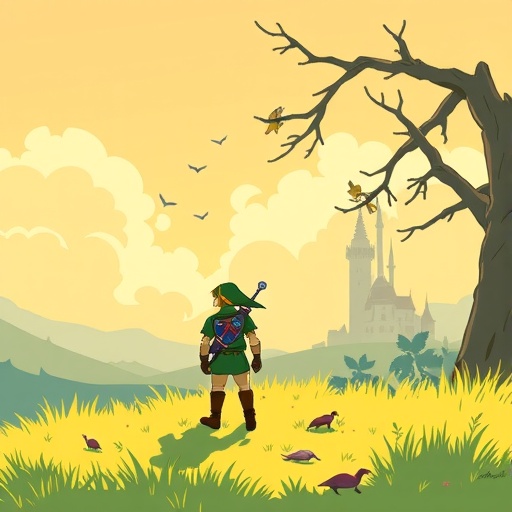In a groundbreaking study published in JMIR Serious Games, researchers have unveiled compelling evidence that immersive engagement with specific cultural and digital media can profoundly enhance young adults’ psychological well-being. By investigating the effects of playing the open-world video game The Legend of Zelda: Breath of the Wild alongside viewing iconic Studio Ghibli films such as My Neighbor Totoro and Kiki’s Delivery Service, the study provides robust insights into how curated leisure experiences cultivate exploration, calmness, mastery, purpose, and ultimately, life satisfaction.
Conducted as an exploratory randomized controlled trial involving 518 postgraduate students, the research team, hailing from Imperial College London, Kyushu Sangyo University, and Georgia State University, sought to quantify how interaction with these richly crafted experiential worlds influences core dimensions of mental health. Participants were systematically randomized to either engage with the game or abstain, and likewise to watch or not watch the nostalgic films, thereby enabling a nuanced assessment of each medium’s individual and combined psychological impact.
At the heart of this investigation lies the hypothesis that open-world games like Breath of the Wild offer unparalleled opportunities for self-directed exploration and skill mastery. Unlike linear gaming experiences, this title presents a vast, dynamic environment encouraging curiosity and problem-solving, which can activate neural pathways associated with reward, learning, and emotional regulation. In parallel, Studio Ghibli films are renowned for their tranquil yet evocative storytelling and artistry, which promote reflective mindfulness and emotional calm, cultivating a contemplative mental state conducive to well-being.
Empirically, the results were striking. Playing Breath of the Wild independently elevated participants’ ratings of life happiness significantly, implying the game’s capacity to engender meaningful psychological uplift through interactivity. However, when combined with the reflective nostalgia elicited by Studio Ghibli’s cinematic narratives, the effect was synergistically enhanced, producing even higher levels of reported happiness. This suggests a complex interplay between active exploration and passive immersion that together amplify positive affect.
The underlying mechanisms driving these improvements were further delineated by psychological metrics capturing exploratory drive, serenity, skill acquisition, life purpose, and meaningfulness. Across these dimensions, participants exposed to both media types exhibited marked increases, signaling that engagement with these culturally rich and mentally stimulating experiences does not merely entertain but invokes fundamental capacities integral to flourishing.
This research importantly confronts prevailing concerns about young adults’ rising anxiety and loneliness. By elucidating how thoughtfully designed and selected leisure activities can serve as accessible, effective mental health interventions, it extends a hopeful narrative about the role of digital and artistic media in contemporary psychological practice. The findings advocate for a paradigm shift where gaming and film are recognized as valuable tools for emotional regulation and existential enrichment rather than mere pastimes.
Technically, the study’s design leveraged randomized allocation and robust psychometric assessments, ensuring the reliability of its conclusions. Its novelty rests in integrating two distinct media forms known for their immersive qualities, thereby enriching the literature on multimedia mental health interventions. Moreover, it foregrounds cultural specificity—highlighting how Japanese game design and cinema resonate cross-culturally to evoke universal human sensations of wonder and meaning.
Further neuroscientific inquiry could elucidate the precise brain circuits modulated during such immersive experiences, potentially involving hippocampal engagement in navigation and memory during gameplay and limbic system activation during emotionally salient film exposure. Understanding these pathways may unlock tailored interventions for mental health challenges using multimedia content.
In an era of digital saturation and social isolation, findings like these underscore the importance of harnessing modern media ecosystems to cultivate human capacities. As interactive and narrative environments evolve in complexity and accessibility, their integration into wellness programs, educational curricula, and therapeutic settings becomes increasingly feasible and desirable.
The study also prompts a reevaluation of the therapeutic potential of nostalgia, as evoked by Studio Ghibli’s films. Nostalgia, often dismissed as mere sentimental yearning, emerges here as a catalyst for psychological resilience, fostering a comforting link to cherished experiences that reinvigorate purpose and calm.
This research invites further exploration into how diverse genres and narrative forms might differentially affect psychological outcomes. Beyond Breath of the Wild and Studio Ghibli, other immersive media could be systematically evaluated for their capacity to promote emotional well-being, guiding a new wave of evidence-based multimedia mental health strategies.
In conclusion, the confluence of open-world video gaming and animated film fosters a fertile psychological space that nurtures exploration, mastery, tranquility, purpose, and happiness. Embedding such experiences in the lives of young people may offer a scalable, culturally resonant, and enjoyable pathway towards alleviating mental distress and enriching life meaning in a digitally mediated society.
Subject of Research: People
Article Title: Effects of The Legend of Zelda: Breath of the Wild and Studio Ghibli Films on Young People’s Sense of Exploration, Calm, Mastery and Skill, Purpose and Meaning, and Overall Happiness in Life: Exploratory Randomized Controlled Study
News Publication Date: 1-Aug-2025
Web References:
- Study in JMIR Serious Games
- JMIR Serious Games Journal
References: DOI: 10.2196/76522
Image Credits: JMIR Publications
Keywords: Mental health, Games, Video games, Controlled trials, Human health, College students, Postdoctoral fellows, Internet, Mass media




